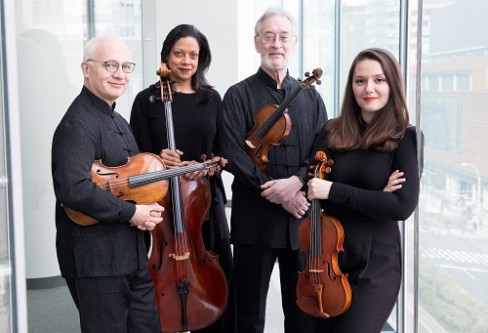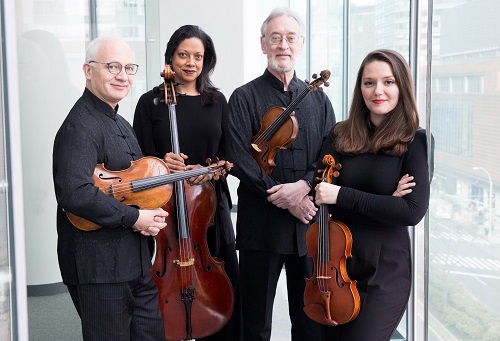 United Kingdom Beethoven, Bartók and Dvořák: Juilliard String Quartet, (Areta Zhulla and Ronald Copes [violins], Roger Tapping [viola], Astrid Schween [cello]), Wigmore Hall, London 15.1.2019. (CSa)
United Kingdom Beethoven, Bartók and Dvořák: Juilliard String Quartet, (Areta Zhulla and Ronald Copes [violins], Roger Tapping [viola], Astrid Schween [cello]), Wigmore Hall, London 15.1.2019. (CSa)

Beethoven – String Quartet in D Op.18 No.3
Bartòk – String Quartet No.3
Dvořák – String Quartet in C Op.61 No.11
Although Beethoven and Bartók dominated the first half of this recital by the pre-eminent Juilliard Quartet, one suspects that it was Brexit and the impending House of Commons vote on Mrs May’s doomed deal that overshadowed it. This could have been one of the reasons for the unexpectedly high number of empty seats for a concert that otherwise would have easily filled any other European venue. A further factor could have been a reaction to change by Wigmore Hall’s traditional base – knowledgeable but famously risk averse. The change in question has been to the Juilliard’s composition in recent years – described rather unkindly by some critics as a veritable game of musical chairs. Founded in 1946, and based in New York City, the Quartet is one of the USA’s oldest and most esteemed. Departures and arrivals within the group over such a lengthy period have inevitably affected its character and style but have also served to energise and renew. In the last five years, though, turnover has been more rapid. In 2013 Roger Tapping, formerly the violist in the Takàcs Quartet, replaced Samuel Rhodes. In 2016, cellist Astrid Schween took the place of Joel Krosnick following his retirement, and last September Areta Zhulla took over from Joseph Lin as the group’s principal violin. Judging by the calibre of this concert, these comings and goings have had absolutely no impact on the outstanding quality of the Quartet’s music-making.
In a delightfully fresh and richly sonorous account of Beethoven’s String Quartet in D Op.18 No.3 – the first he ever wrote – the players injected just the right element of playfulness in the opening Allegro. The wistful Andante con moto was taken at perfect speed and contained passages of great serenity, contrasting perfectly with the joyfully brisk canter of the third movement Allegro. Fizzing with energy, the final Presto was a particular pleasure, and would surely have brought a smile to the lips of Beethoven’s teacher and mentor Haydn, whose influence so characterises this early work.
The dark complexity of Bartók’s String Quartet No.3 was fully realised. Although clearly divided into four parts, the work is played without a break, the players making light of its technical challenges. Severe and modernist in style, Bartók injects into the first part some dazzlingly colourful passages along with moments of utter desolation. These alternating changes in texture and rhythm were beautifully captured by some fine ensemble playing, as were the fragments of Hungarian folk melodies and the earthy rustic dance in the second part.
A ravishing account of Dvořák’s String Quartet in C completed the Juilliard’s pre-Brexit musical tour around central Europe. The gentle rocking motion of the opening Allegro and the honeyed second movement marked Poco adagio offered a degree of comfort after the rigours of Bartók, whilst the lilting rhythms of the Scherzo and the gossamer Finale were played with wit and humour and brought the evening to a fitting close.
Chris Sallon
For more about the Juilliard String Quartet click here.
